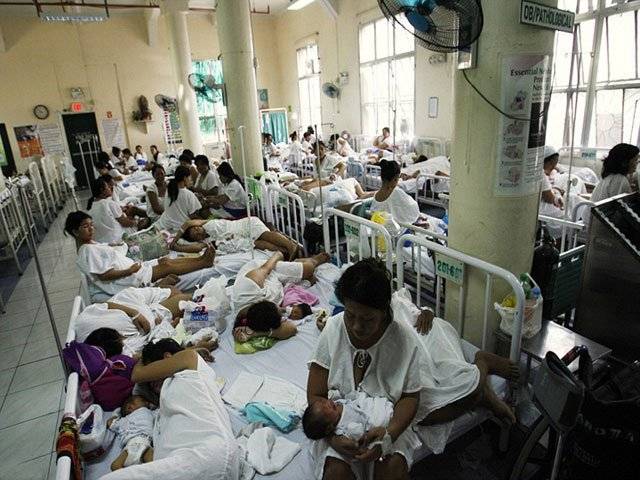It may look more like an overcrowded squat but this is actually a maternity ward. The ward is at Dr Jose Fabella Memorial Hospital in Manila in the Philippines where some 300 new mothers crammed three to a bed. It is one of the busiest maternity wards in the world with an average of 60 births a day but it can record as many as 100 in 24 hours. 'Sometimes, during high season, 13 to 16 babies are in the delivery room at the same time, Arlene Matanguihan, a resident doctor, told the Guardian. 'Its chaotic but an organised chaos. We can still manage no baby drops out on the floor. The Philippines has a staggering population growth rate of around 2 per cent, way above the average for South East Asia (1.7 per cent), with around 200 babies born per hour nationally. Lack of a national policy on birth control is partly blamed for the unregulated population explosion in a devoutly Catholic country where 90 per cent of the people ascribe to the religion. Birth control is frowned upon by the powerful Catholic church but the combination of factors has led to the Philippines becoming the second most populous nation in the region after Indonesia. With around 90million people in its borders questions are being asked as to whether the country can sustain its population rates and how to go about tackling the issue. The government is now discussing the introduction of family planning legislation which would allow for sex education in schools, and advice on - and better access to - birth control. The Catholics Bishops Conference of the Philippines is openly revolting against the plans and has even threatened to excommunicate the president if he follows through with the policy. Catholics see birth control and abortion as contrary to 'Gods will that we procreate, but politicians know they have to begin to exert control over the issue. Congressman Edcel Lagman, who authored the bill in the House of Representatives, said it would benefit people on healthcare, educational and human rights platforms. 'It will help give parents the chance to exercise their right to free and responsibly plan the number and spacing of their children, and help improve maternal newborn education and reduce infant and maternal mortality, he said. -DM
Tuesday, April 16, 2024
Busiest maternity wards in world

5:39 PM | April 15, 2024
Pakistan, IMF discussing new multi-billion-dollar program, says Finance Minister Aurangzeb
11:09 AM | April 16, 2024
LESCO ‘bars’ officers from appearing before FIA in overbilling probe
10:49 AM | April 16, 2024
Aleem Khan, Kamran Tessori discuss matters of mutual interests
10:40 AM | April 16, 2024
Global brands facing challenge from local contenders in Pakistan's FMCG market
10:24 AM | April 16, 2024
Israeli Air Force finalizes preparations for possible attack on Iran
8:21 AM | April 16, 2024
Political Reconciliation
April 16, 2024
Pricing Pressures
April 16, 2024
Western Hypocrisy
April 16, 2024
Policing Reforms
April 15, 2024
Storm Safety
April 15, 2024
Democratic harmony
April 16, 2024
Digital dilemma
April 16, 2024
Classroom crisis
April 16, 2024
Bridging gaps
April 16, 2024
Suicide awareness
April 15, 2024
ePaper - Nawaiwaqt
Advertisement
Nawaiwaqt Group | Copyright © 2024





